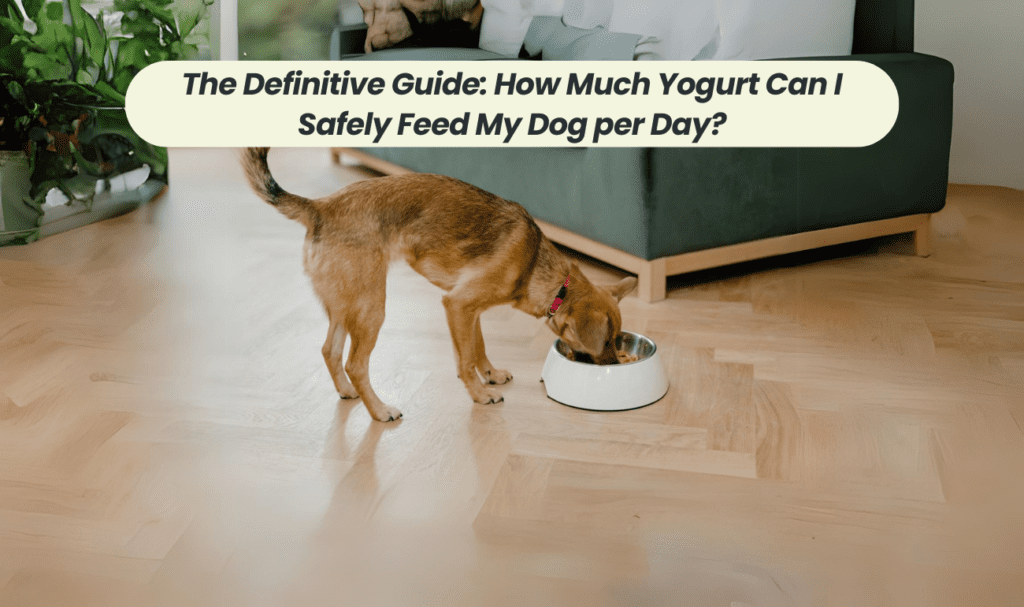As a dog owner, you may wonder if giving your furry friend yogurt as a treat or as part of their regular diet is safe. Yogurt can be a healthy addition to your dog’s meals, but it’s important to know how much is safe to feed them daily. In this definitive guide, we will explore the benefits of feeding dogs, its nutritional value, factors to consider, recommended amounts, signs of yogurt intolerance, suitable flavors and types, how to introduce yogurt to your dog’s diet, and the precautions and potential risks involved.
- Benefits of feeding yogurt to dogs
- Nutritional value of yogurt for dogs
- Factors to consider when feeding yogurt to dogs
- Recommended amount of yogurt for dogs
- Signs of yogurt intolerance in dogs
- Yogurt flavors and types suitable for dogs
- How to introduce yogurt to your dog’s diet
- Precautions and potential risks of feeding yogurt to dogs
- FAQ’s
- Conclusion: Yogurt as a healthy treat for your furry friend
Benefits of feeding yogurt to dogs
Yogurt can offer several health benefits to dogs. Firstly, it is a great protein, calcium, and probiotic source. These nutrients contribute to your dog’s overall health and well-being. Probiotics, in particular, promote a healthy gut by balancing the bacteria in the digestive system. This can improve digestion and boost their immune system.
Additionally, yogurt can help with any gastrointestinal issues your dog may be experiencing. It can relieve dogs with diarrhea or constipation by regulating their bowel movements. The live cultures in yogurt can also help prevent and treat yeast infections in dogs. Moreover, yogurt can be useful in maintaining your dog’s oral health, as it helps reduce bad breath and plaque buildup.
Nutritional value of yogurt for dogs
Yogurt contains various nutrients that are beneficial to your dog’s health. It is rich in protein, essential for muscle development and repair. Calcium, another important nutrient in yogurt, helps support strong bones and teeth. The probiotics in yogurt aid digestion and improve the absorption of nutrients from other foods.
It’s essential to choose plain yogurt without added sugars or artificial sweeteners. These additives can harm your dog’s health and cause gastrointestinal issues. Avoid flavored yogurts, which often contain high sugar levels, leading to weight gain and dental problems. Always check the label to ensure that your yogurt is free from harmful ingredients.
Factors to consider when feeding yogurt to dogs
Before incorporating yogurt into your dog’s diet, consider a few factors. Firstly, consult your veterinarian to ensure that yogurt suits your dog’s specific dietary needs. Some dogs may have underlying health conditions that require a different diet. Additionally, puppies and older dogs may have different nutritional requirements, so it’s important to consider their age.
It’s also crucial to introduce yogurt gradually into your dog’s diet. Start with small amounts and monitor their reaction. If your dog shows discomfort or digestive issues, such as vomiting or diarrhea, discontinue feeding them yogurt and consult your veterinarian. Each dog is unique, so observing how they react and adjusting accordingly is important.
Recommended amount of yogurt for dogs
The recommended amount of yogurt to feed your dog daily depends on their size and overall health. As a general guideline, small dogs weighing up to 20 pounds can be given 1 to 2 tablespoons of yogurt daily. Medium-sized dogs weighing between 20 and 50 pounds can have 2 to 4 tablespoons, while large dogs weighing over 50 can be given 4 to 6 tablespoons.
Remember to consider the yogurt as part of your dog’s overall diet. If you are feeding them yogurt as a treat, adjust their regular meals accordingly to avoid overfeeding. Yogurt should never exceed 10% of their daily caloric intake. It’s always best to consult your veterinarian to determine the appropriate amount of yogurt for your dog’s needs.
Also Read : How to know if your dog is hungry
Signs of yogurt intolerance in dogs
While yogurt is generally safe for dogs, some may develop an intolerance or an allergic reaction. It’s important to be aware of the signs of yogurt intolerance, which may include diarrhea, vomiting, gas, bloating, or changes in appetite. If you notice any of these symptoms after feeding your dog yogurt, discontinue giving it to them and consult your veterinarian.
It’s worth noting that lactose intolerance is relatively common in dogs. However, the live cultures in yogurt can help dogs with lactose intolerance digest the lactose more easily. If your dog is lactose intolerant, choose a yogurt with live cultures or lactose-free yogurt.
Yogurt flavors and types suitable for dogs
When selecting a yogurt for your dog, it’s important to choose plain, unsweetened yogurt without any added flavors or sweeteners. Avoid yogurts with artificial colors or preservatives, which can harm your dog’s health. Greek yogurt can be a good option, as it is higher in protein and lower in lactose.
How to introduce yogurt to your dog’s diet
To introduce yogurt to your dog’s diet, start by offering them a small amount as a treat or mix it with their regular food. Gradually increase the amount over time while monitoring their reaction. It’s important to introduce new foods slowly to avoid any digestive upset.
Precautions and potential risks of feeding yogurt to dogs
While yogurt is generally safe for dogs, there are a few precautions to remember. Some dogs may be allergic to dairy or have specific dietary restrictions. Always consult your veterinarian before introducing yogurt or any new food into your dog’s diet.
Additionally, excessive yogurt consumption can lead to weight gain and other health issues. Remember to consider the yogurt as part of your dog’s overall caloric intake and adjust their meals accordingly. Maintaining a balanced diet for your dog is important to ensure optimal health.
FAQ’s
How much yogurt can a dog eat per day?
Generally, dogs can eat small amounts of yogurt as an occasional treat. A teaspoon to a tablespoon of plain, unsweetened yogurt per day is typically safe for dogs, depending on their size and tolerance.
How much yogurt can I give my sick dog?
If your dog is sick, it’s best to consult with your veterinarian before giving them yogurt or any other food.
Can dogs eat yogurt safely?
Dogs can eat yogurt safely in moderation, especially plain yogurt without added sugars or artificial sweeteners. Yogurt can provide probiotics that may benefit their digestive health.
Is curd good for dogs every day?
Curd, which is similar to yogurt, can be given to dogs in small amounts as an occasional treat. Like yogurt, plain curd without added sugars or flavors is preferable.
Conclusion: Yogurt as a healthy treat for your furry friend
In conclusion, when fed appropriately, yogurt can be a healthy addition to your dog’s diet. It offers various nutritional benefits, including protein, calcium, and probiotics. However, choosing plain, unsweetened yogurt without any harmful additives is important. Introduce yogurt gradually into your dog’s diet and monitor their reaction. If any signs of intolerance or allergies occur, discontinue feeding them yogurt and consult your veterinarian. Always consider your dog’s specific dietary needs and consult your veterinarian for personalized recommendations. With the right precautions, yogurt can be a delicious and nutritious treat for your furry friend.

